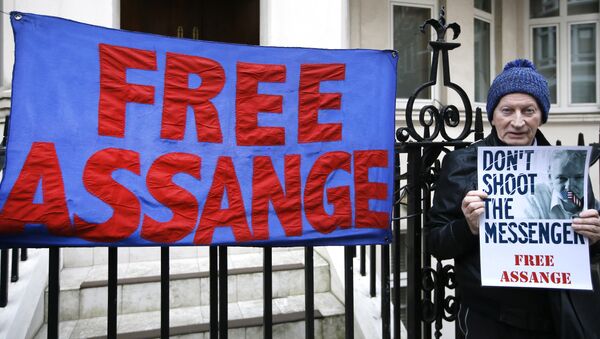"History shows the danger of allowing the CIA or any intelligence agency, whose very modus operandi includes misdirection and lying, to be the sole arbiter of what is true or what is prudent," WikiLeaks said in a statement on Friday.
The statement, published on WikiLeaks’ Twitter account and marked "Julian Assange" at the bottom of the memo, declares Pompeo’s characterization of WikiLeaks as a "non-state intelligence service" is "absurd" – and dangerous. "This absurd definition would have all serious media organizations (with the exception of state owned media) transformed into ‘non-state intelligence services,'" Assange warned.
Such a war of words, WikiLeaks alleges, comports with what Assange calls Pompeo’s "explicitly stated goal of stripping constitutional protections for publishers."
In his speech at Center for Strategic and International Studies in Washington, DC, Pompeo said it was time for WikiLeaks and other organizations to stop "hiding behind" their screens and that they are not protected by First Amendment freedoms.
What keeps WikiLeaks from being a "intelligence service" is that it broadcasts its information to massive audiences: some 4.5 million Twitter accounts follow WikiLeaks. Intelligence agencies, on the other hand, don’t broadcast what they know. Such closed-door operations are partly what drove WikiLeaks into existence.
— WikiLeaks (@wikileaks) April 14, 2017
While Pompeo attacked Assange personally, calling him a "narcissist" and "coward," Assange and WikiLeaks took the higher road. "The public can judge what is fraudulent about an award-winning decade-long record for publishing the truth and what is cowardly about WikiLeaks standing up to years of authoritarian bullying," Assange wrote.
What’s more, not less than one year ago Pompeo himself tweeted from his Congressional Twitter account a document published by WikiLeaks. Pompeo was serving at the time as a United States House Representative from Kansas’ Fourth District.
— WikiLeaks (@wikileaks) April 13, 2017
And yet Pompeo, who attended West Point and Harvard Law School and found WikiLeaks an acceptable source during his tenure with Congress, condemned WikiLeaks, as well as other publishers like RT and The Intercept, in his first public appearance as CIA director.
Pompeo isn’t the only one to flip-flop on WikiLeaks’ usefulness: US President Donald Trump also publicly declared "I love WikiLeaks!" while on the campaign trail.
"Pompeo’s speech attempting to stifle speech only serves to underscore why WikiLeaks’ publications are necessary," Assange said.


